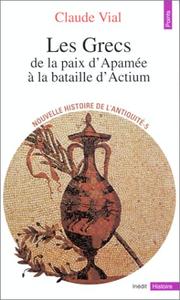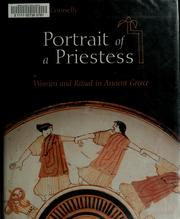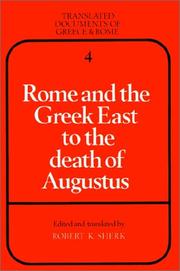| Listing 1 - 10 of 10 |
Sort by
|
Book
Abstract | Keywords | Export | Availability | Bookmark
 Loading...
Loading...Choose an application
- Reference Manager
- EndNote
- RefWorks (Direct export to RefWorks)
Inscriptions grecques --- Grèce --- 146 av. j.c.-395 (époque romaine)

ISBN: 9607905199 9789607905192 Year: 2004 Publisher: Athènes: Centre de recherches de l'Antiquité grecque et romaine,
Abstract | Keywords | Export | Availability | Bookmark
 Loading...
Loading...Choose an application
- Reference Manager
- EndNote
- RefWorks (Direct export to RefWorks)
Coins, Roman --- Monnaies romaines --- Propagande romaine --- Rome --- Numismatique antique --- Grèce --- Colonies --- 146 av. J.C.-395 (Époque romaine)

ISBN: 2020131315 2757845020 9782020131315 Year: 1995 Volume: H216 Publisher: Paris: Seuil,
Abstract | Keywords | Export | Availability | Bookmark
 Loading...
Loading...Choose an application
- Reference Manager
- EndNote
- RefWorks (Direct export to RefWorks)
Grece --- Greece --- Grèce --- History --- Histoire --- -History --- -Greece --- -Grece --- Grèce --- Rome --- Greece - History - 281-146 BC --- Greece - History - 146 BC-323 AD --- Histoire ancienne --- 146 av. J.-C.-395 (Epoque romaine) --- 264-30 av. J.-C.

ISBN: 0472112384 9780472112388 Year: 2002 Publisher: Ann Arbor: University of Michigan press,
Abstract | Keywords | Export | Availability | Bookmark
 Loading...
Loading...Choose an application
- Reference Manager
- EndNote
- RefWorks (Direct export to RefWorks)
Greek inscriptions form a valuable resource for the study of every aspect of life and death in the Greco-Roman world. They are primary witnesses to society's laws and institutions social structures public cults and private associations and, of course, language. 'An Introduction to Greek Epigraphy' provides students and classicists with the tools to take advantage of the social and historical weight of these treasures. The book begins by examining letter forms, ancient names, and ancient calendars, knowledge of which is essential in reading inscriptions of all kinds. B. H. McLean discusses the classification of inscriptions into their various categories and analyzes particular types of inscriptions, including decrees, honorary inscriptions, dedications, funerary inscriptions, and manumission inscriptions. Finally, McLean includes special topics that bear upon the interpretation of specific features of inscriptions, such as Greek and Roman administrative titles and functions. Well-organized and clear as well as insightful and original, McLean's 'Introduction to Greek Epigraphy' is an excellent source for beginners, nonspecialists, and specialists alike. The volume will be useful to students and scholars studying epigraphy and to those who study politics, governmental organization, archaeology, and ancient history or culture. B. H. McLean is Professor of New Testament, Knox College, University of Toronto.
Inscriptions, Greek --- Inscriptions grecques --- Handbooks, manuals, etc. --- Guides, manuels, etc --- Greece --- Rome --- Grèce --- History --- Sources --- Histoire --- Antiquities --- Inscriptions, Greek. --- Antiquities. --- Grèce --- Greek inscriptions --- Greek language --- Greek philology --- Sources. --- Greece - Antiquities --- Greece - History - To 146 B.C. --- Greece - History - 146 B.C.-323 A.D. --- Épigraphie --- Antiquité --- Antiquités --- Jusqu'à 146 av. J.-C. --- 146 av. J.C.-395 (Époque romaine)
Book
Abstract | Keywords | Export | Availability | Bookmark
 Loading...
Loading...Choose an application
- Reference Manager
- EndNote
- RefWorks (Direct export to RefWorks)
Historiography. --- Land-tenure --- Property. --- Khio --- Alsace-Lorraine question. --- Polybe (0200-0120 av. j.-c.) --- Propriété foncière --- Chio (grèce ; île) --- Grèce --- Alsace (france) --- Histoire ancienne --- History --- Histoire --- 146 av. j. c.-395 (époque romaine) --- 19e siècle --- Polybius. --- Rome --- Propriété foncière --- Chio (grèce ; île) --- Grèce --- 146 av. j. c.-395 (époque romaine) --- 19e siècle

ISBN: 9780691127460 0691127468 0691143846 1400832691 Year: 2007 Publisher: Princeton: Princeton university press,
Abstract | Keywords | Export | Availability | Bookmark
 Loading...
Loading...Choose an application
- Reference Manager
- EndNote
- RefWorks (Direct export to RefWorks)
Archaeologist Connelly gives us the first comprehensive cultural history of priestesses in the ancient Greek world. Connelly presents the fullest picture yet of how priestesses lived and worked, from the most famous and sacred of them--the Delphic Oracle and the priestess of Athena Polias--to basket bearers and handmaidens. Along the way, she challenges long-held beliefs to show that priestesses played far more significant public roles in ancient Greece than previously acknowledged. Connelly examines archaeological evidence in the broader context of literary sources, inscriptions, sculpture, and vase painting. The picture that emerges reveals that women in religious office were not as secluded and marginalized as we have thought--that religious office was one arena in ancient Greece where women enjoyed privileges and authority comparable to that of men. Connelly concludes by examining women's roles in early Christianity, taking on the larger issue of the exclusion of women from the Christian priesthood.--From publisher description.
Women and religion --- Women priests --- Femmes et religion --- Femmes prêtres --- History --- Histoire --- Greece --- Grèce --- Religion. --- Antiquities. --- Religion --- Antiquités --- Antiquities --- Femmes prêtres --- Grèce --- Antiquités --- Priestesses --- Women in the ministry --- Priests --- Women clergy --- Religion and women --- Women in religion --- Sexism in religion --- Rome --- Women and religion - Greece --- Women priests - Greece --- Greece - Religion --- Greece - Antiquities --- Greece - History - 146 B.C.-323 A.D. --- Prêtresses --- Religion grecque --- Antiquité --- 146 av. J.C.-395 (Époque romaine)
Book
ISBN: 9780521519304 0521519306 9780511576508 9780511517914 0511517912 0511576501 1107191920 9786612103865 0511515421 0511514379 0511516703 9781107191921 6612103868 9780511515422 9780511514371 9780511516702 1108994032 Year: 2009 Volume: *7 Publisher: Cambridge [etc.] Cambridge University Press
Abstract | Keywords | Export | Availability | Bookmark
 Loading...
Loading...Choose an application
- Reference Manager
- EndNote
- RefWorks (Direct export to RefWorks)
In the first two centuries AD, the eastern Roman provinces experienced a proliferation of elite public generosity unmatched in their previous or later history. In this study, Arjan Zuiderhoek attempts to answer the question why this should have been so. Focusing on Roman Asia Minor, he argues that the surge in elite public giving was not caused by the weak economic and financial position of the provincial cities, as has often been maintained, but by social and political developments and tensions within the Greek cities created by their integration into the Roman imperial system. As disparities of wealth and power within imperial polis society continued to widen, the exchange of gifts for honours between elite and non-elite citizens proved an excellent political mechanism for deflecting social tensions away from open conflicts towards communal celebrations of shared citizenship and the legitimation of power in the cities.
Roman provinces --- Gifts --- Benefactors --- Provinces romaines --- Cadeaux --- Bienfaiteurs --- Social conditions. --- Political aspects --- Provinces --- Provinces. --- Conditions sociales --- Aspect politique --- Rome --- History --- Histoire --- City and town life --- Elite (Social sciences) --- Social classes --- History. --- Greece --- Social conditions --- Provinces of Rome --- Donations --- Presents --- Generosity --- Manners and customs --- Free material --- Elites (Social sciences) --- Leadership --- Power (Social sciences) --- Social groups --- City life --- Town life --- Urban life --- Sociology, Urban --- Donors (Benefactors) --- Patrons (Benefactors) --- Persons --- Philanthropists --- Class distinction --- Classes, Social --- Rank --- Caste --- Estates (Social orders) --- Social status --- Class consciousness --- Classism --- Social stratification --- Political aspects&delete& --- Roman provinces. --- Arts and Humanities --- Élite (sciences sociales) --- Stratification sociale --- Grèce --- Asie mineure --- 146 av. J.C.-395 (Époque romaine)
Book
ISBN: 9782869582125 2869582129 Year: 2010 Volume: 341 Publisher: Rome: École française d'Athènes,
Abstract | Keywords | Export | Availability | Bookmark
 Loading...
Loading...Choose an application
- Reference Manager
- EndNote
- RefWorks (Direct export to RefWorks)
Justice, Administration of --- Hellenism. --- Justice --- Hellénisme --- Provinces --- Administration --- Rome --- Greece --- Grèce --- History --- Histoire --- Hellenism --- History. --- Provinces. --- Roman history of law --- Roman history of law. --- Hellénisme --- Grèce --- Administration of justice --- Law --- Courts --- Law and legislation --- Justice, Administration of - Rome - History --- Justice, Administration of - Rome - Provinces --- Rome - History - Republic, 265-30 B.C --- Rome - History - Empire, 30 BC-476 AD --- Greece - History - 281-146 BC --- Provinces orientales --- Asie (province romaine) --- Antiquité --- 146 av. J.C.-395 (Époque romaine) --- Politique et gouvernement --- 264-30 av. J.-C. --- 30 av. J.-C.-284 --- 146 av. J.C.-395 (Époque romaine)

ISBN: 3515076484 9783515076487 Year: 2002 Volume: 165. Publisher: Stuttgart: Steiner,
Abstract | Keywords | Export | Availability | Bookmark
 Loading...
Loading...Choose an application
- Reference Manager
- EndNote
- RefWorks (Direct export to RefWorks)
Governors --- Roman provinces --- Romans --- History --- Administration. --- Greece --- Rome --- Politics and government --- Ethnology --- Italic peoples --- Latini (Italic people) --- State governments --- Kings and rulers --- Public officers --- Administration --- Gouverneurs --- Romains --- Histoire --- Grèce --- Provinces --- Politique et gouvernement --- Governors - Rome. --- Governors - Greece - History - To 1500. --- Governors - Middle East - History - To 1500. --- Romans - Greece. --- Romans - Middle East. --- Roman provinces - Administration --- Governors - Greece - History - To 1500 --- Governors - Middle East - History - To 1500 --- Romans - Greece --- Romans - Middle East --- Greece - Politics and government - 146 B.C.-323 A.D --- Rome - Politics and government - 30 BC-284 AD --- Grece --- 146 av. j.-c.-395 (epoque romaine) --- 265-30 av. j.-c. (republique) --- 30 av. j.-c.-476 (empire)

ISBN: 0521271231 0521249953 0511552688 9780521249959 9780521271233 Year: 1984 Volume: 4 Publisher: Cambridge: Cambridge university press,
Abstract | Keywords | Export | Availability | Bookmark
 Loading...
Loading...Choose an application
- Reference Manager
- EndNote
- RefWorks (Direct export to RefWorks)
This is a collection in English translation of Greek and Latin sources for the study of Greek and Roman history, sources which are mainly inscriptions and papyri. They do not include the major authors such as Polybius and Livy. Where those authors have provided us with the broad outline of the Roman presence in the Greek world, this collection allows the student and reader to penetrate beneath what they have to tell us and to see details otherwise unreported. Much of this documentary material having never before been translated into English, it has been all too often neglected in colleges and universities at all levels. The theme of the present collection is the Roman presence in the Greek East, the nature of the Roman hegemony, the diplomatic moves on both sides, and the reaction of the Greeks, during the period from the last decades of the third century BC to the death of Augustus in AD 14. It includes such materials as treaties of alliance and friendship, honorary decrees, official letters of Roman governors, decrees of the Roman senate, dedications of statues, Roman laws, reports of embassies, religious cults, legal decisions, loyalty oaths to Rome, athletic contests, calendars, and minutes of an audience in Rome given by the emperor. Brief commentary and notes accompany the translations, making this book a collection to be welcomed by students and teachers of ancient history.
--IIIe-Ier s. av JC, --- --Publication de sources --- --Greece --- Greece --- Rome --- Rim --- Roman Empire --- Roman Republic (510-30 B.C.) --- Romi (Empire) --- Byzantine Empire --- Rome (Italy) --- Griechenland --- Grèce --- Hellas --- Yaṿan --- Vasileion tēs Hellados --- Hellēnikē Dēmokratia --- République hellénique --- Royaume de Grèce --- Kingdom of Greece --- Hellenic Republic --- Ancient Greece --- Ελλάδα --- Ellada --- Ελλάς --- Ellas --- Ελληνική Δημοκρατία --- Ellēnikē Dēmokratia --- Elliniki Dimokratia --- Grecia --- Grčija --- Hellada --- اليونان --- يونان --- al-Yūnān --- Yūnān --- 希腊 --- Xila --- Греция --- Gret︠s︡ii︠a︡ --- History --- Relations --- Colonies --- Administration --- Histoire romaine --- Sources --- Arts and Humanities --- IIIe-Ier s. av JC, 300-1 av JC --- Publication de sources --- Greece - History - 281-146 BC - Sources --- Greece - History - 146 BC-323 AD - Sources --- Rome - History - Republic, 265-30 B.C. - Sources --- Rome - History - Augustus, 30 BC-14 AD - Sources --- Greece - Relations - Rome - Sources --- Rome - Relations - Greece - Sources --- Rome - Colonies - Administration - History - Sources --- Administrative and political divisions --- Grèce --- 281-146 av. J.C. --- 146 av. J.C.-395 (Époque romaine) --- 265-30 av. J.-C. (République) --- 30 av. J.-C.-14 (Auguste)
| Listing 1 - 10 of 10 |
Sort by
|

 Search
Search Feedback
Feedback About UniCat
About UniCat  Help
Help News
News